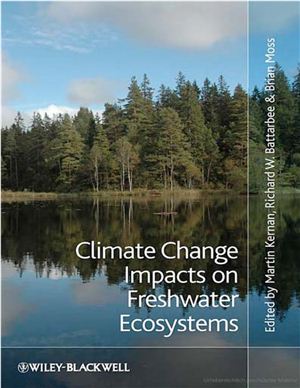Wiley - Blackwell Publishing Ltd, 2010, 314 pages
Climate change is occurring and there is little doubt now that human activity is the principal cause. However, the full extent of the impact of climate change on freshwater ecosystems is difficult to detect as other pressures on our freshwaters, such as pollution and land-use change, are still more important. But as temperatures continue to rise and pollution pressures are reduced, climate change will become the dominant threat to our freshwaters in future.
In this book we examine the impact of climate change on freshwater ecosystems, past, present and future. We consider especially the interactions between climate change and other drivers of change including hydromorphological modification, nutrient loading, acid deposition and contamination by toxic substances using evidence from palaeolimnology, time-series analysis, space-for-time substitution, laboratory and field experiments and process modelling. The book evaluates these processes in relation to extreme events, seasonal changes in ecosystems, trends over decadal-scale time periods, mitigation strategies and ecosystem recovery.
The book is also conceed with how aspects of hydrophysical, hydrochemical and ecological change can be used as early indicators of climate change in aquatic ecosystems and it addresses the implications of future climate change for freshwater ecosystem management at the catchment scale. The book is aimed at the scientific research community, but is also accessible to Masters and senior undergraduate students.
Climate change is occurring and there is little doubt now that human activity is the principal cause. However, the full extent of the impact of climate change on freshwater ecosystems is difficult to detect as other pressures on our freshwaters, such as pollution and land-use change, are still more important. But as temperatures continue to rise and pollution pressures are reduced, climate change will become the dominant threat to our freshwaters in future.
In this book we examine the impact of climate change on freshwater ecosystems, past, present and future. We consider especially the interactions between climate change and other drivers of change including hydromorphological modification, nutrient loading, acid deposition and contamination by toxic substances using evidence from palaeolimnology, time-series analysis, space-for-time substitution, laboratory and field experiments and process modelling. The book evaluates these processes in relation to extreme events, seasonal changes in ecosystems, trends over decadal-scale time periods, mitigation strategies and ecosystem recovery.
The book is also conceed with how aspects of hydrophysical, hydrochemical and ecological change can be used as early indicators of climate change in aquatic ecosystems and it addresses the implications of future climate change for freshwater ecosystem management at the catchment scale. The book is aimed at the scientific research community, but is also accessible to Masters and senior undergraduate students.

